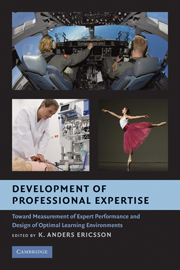 Development of Professional Expertise
Development of Professional Expertise Book contents
- Frontmatter
- Contents
- List of Figures
- List of Tables
- List of Contributors
- 1 The Measurement and Development of Professional Performance: An Introduction to the Topic and a Background to the Design and Origin of This Book
- SECTION 1 CHALLENGES IN PAST AND CONTEMPORARY EFFORTS TO MEASURE AND TRAIN THE OBJECTIVE PERFORMANCE OF PROFESSIONALS
- SECTION 2 PAST AND CONTEMPORARY EFFORTS TO DESIGN INSTRUCTION, TRAIN, AND MAINTAIN PROFESSIONAL PERFORMANCE
- SECTION 3 THE ASSESSMENT AND TRAINING OF SKILLED AND EXPERT PERFORMERS IN THE MILITARY
- SECTION 4 THE DEVELOPMENT OF EXPERTISE AND EXPERT PERFORMANCE
- Name Index
- Subject Index
- References
1 - The Measurement and Development of Professional Performance: An Introduction to the Topic and a Background to the Design and Origin of This Book
Published online by Cambridge University Press: 04 August 2010
- Frontmatter
- Contents
- List of Figures
- List of Tables
- List of Contributors
- 1 The Measurement and Development of Professional Performance: An Introduction to the Topic and a Background to the Design and Origin of This Book
- SECTION 1 CHALLENGES IN PAST AND CONTEMPORARY EFFORTS TO MEASURE AND TRAIN THE OBJECTIVE PERFORMANCE OF PROFESSIONALS
- SECTION 2 PAST AND CONTEMPORARY EFFORTS TO DESIGN INSTRUCTION, TRAIN, AND MAINTAIN PROFESSIONAL PERFORMANCE
- SECTION 3 THE ASSESSMENT AND TRAINING OF SKILLED AND EXPERT PERFORMERS IN THE MILITARY
- SECTION 4 THE DEVELOPMENT OF EXPERTISE AND EXPERT PERFORMANCE
- Name Index
- Subject Index
- References
Summary
Developments in technology and software engineering are making many types of traditional jobs, such as bookkeeping, accounting, routine design, and document indexing, virtually obsolete (Rasmussen, 2000). The rapid improvements in technology and automated work methods challenge even the traditional idea of stable job competence, as well as the ability to predict the length and the nature of current or future professional careers. Today's work conditions require ongoing adaptations by employees and entrepreneurs to new demands and competitive opportunities through continuing education and training. Technological innovations, such as the World Wide Web, broadband communication, and highly portable communication and work devices, have reduced the constraints of geography on work. Today, many services can be provided with an equivalent level of quality irrespective of whether the provider is in the office next door or on a different continent. It is, indeed, becoming an age of global consumerism in which one can “work with anyone, anytime, anywhere.” Additionally, many specialized skills previously performed by human beings are now the purview of automated systems, and can often be conducted anywhere in the world at a fraction of the cost if carried out in Western Europe and North America. This technological revolution suggests that the competitive advantage of any country aspiring to economic prosperity is increasingly dependent on the capability of both its research and development groups and its skilled workforce, not only to create and develop new and improved products that are at the cutting edge, but also to quickly react and adapt to market forces.
Information
- Type
- Chapter
- Information
- Development of Professional ExpertiseToward Measurement of Expert Performance and Design of Optimal Learning Environments, pp. 1 - 24Publisher: Cambridge University PressPrint publication year: 2009
References
Accessibility standard: Unknown
Why this information is here
This section outlines the accessibility features of this content - including support for screen readers, full keyboard navigation and high-contrast display options. This may not be relevant for you.Accessibility Information
- 10
- Cited by